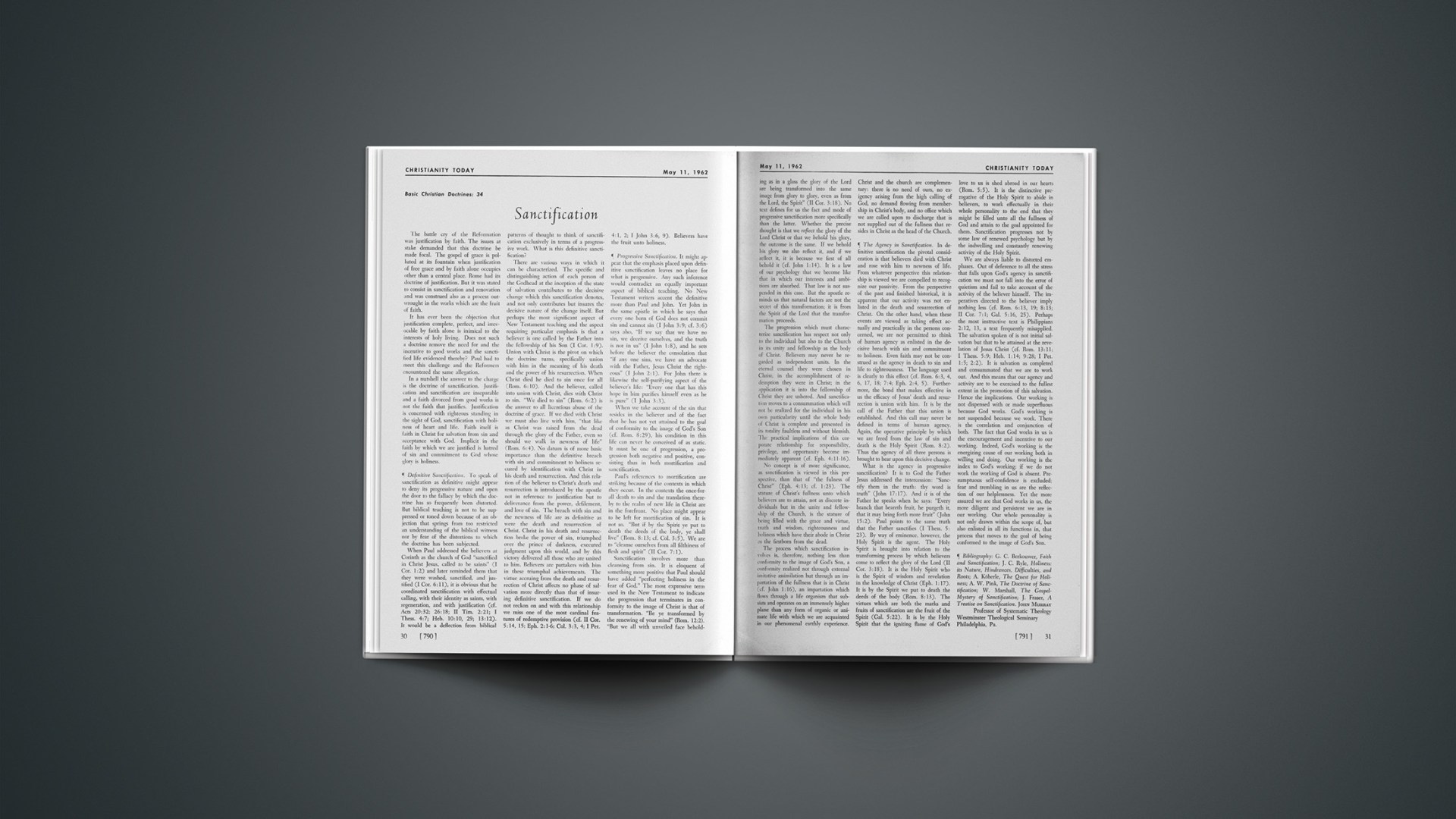The battle cry of the Reformation was justification by faith. The issues at stake demanded that this doctrine be made focal. The gospel of grace is polluted at its fountain when justification of free grace and by faith alone occupies other than a central place. Rome had its doctrine of justification. But it was stated to consist in sanctification and renovation and was construed also as a process out-wrought in the works which are the fruit of faith.
It has ever been the objection that justification complete, perfect, and irrevocable by faith alone is inimical to the interests of holy living. Does not such a doctrine remove the need for and the incentive to good works and the sanctified life evidenced thereby? Paul had to meet this challenge and the Reformers encountered the same allegation.
In a nutshell the answer to the charge is the doctrine of sanctification. Justification and sanctification are inseparable and a faith divorced from good works is not the faith that justifies. Justification is concerned with righteous standing in the sight of God, sanctification with holiness of heart and life. Faith itself is faith in Christ for salvation from sin and acceptance with God. Implicit in the faith by which we are justified is hatred of sin and commitment to God whose glory is holiness.
Definitive Sanctification. To speak of sanctification as definitive might appear to deny its progressive nature and open the door to the fallacy by which the doctrine has so frequently been distorted. But biblical teaching is not to be suppressed or toned down because of an objection that springs from too restricted an understanding of the biblical witness nor by fear of the distortions to which the doctrine has been subjected.
When Paul addressed the believers at Corinth as the church of God “sanctified in Christ Jesus, called to be saints” (1 Cor. 1:2) and later reminded them that they were washed, sanctified, and justified (1 Cor. 6:11), it is obvious that he coordinated sanctification with effectual calling, with their identity as saints, with regeneration, and with justification (cf. Acts 20:32; 26:18; 2 Tim. 2:21; 1 Thess. 4:7; Heb. 10:10, 29; 13:12). It would be a deflection from biblical patterns of thought to think of sanctification exclusively in terms of a progressive work. What is this definitive sanctification?
There are various ways in which it can be characterized. The specific and distinguishing action of each person of the Godhead at the inception of the state of salvation contributes to the decisive change which this sanctification denotes, and not only contributes but insures the decisive nature of the change itself. But perhaps the most significant aspect of New Testament teaching and the aspect requiring particular emphasis is that a believer is one called by the Father into the fellowship of his Son (1 Cor. 1:9). Union with Christ is the pivot on which the doctrine turns, specifically union with him in the meaning of his death and the power of his resurrection. When Christ died he died to sin once for all (Rom. 6:10). And the believer, called into union with Christ, dies with Christ to sin. “We died to sin” (Rom. 6:2) is the answer to all licentious abuse of the doctrine of grace. If we died with Christ we must also live with him, “that like as Christ was raised from the dead through the glory of the Father, even so should we walk in newness of life” (Rom. 6:4). No datum is of more basic importance than the definitive breach with sin and commitment to holiness secured by identification with Christ in his death and resurrection. And this relation of the believer to Christ’s death and resurrection is introduced by the apostle not in reference to justification but to deliverance from the power, defilement, and love of sin. The breach with sin and the newness of life are as definitive as were the death and resurrection of Christ. Christ in his death and resurrection broke the power of sin, triumphed over the prince of darkness, executed judgment upon this world, and by this victory delivered all those who are united to him. Believers are partakers with him in these triumphal achievements. The virtue accruing from the death and resurrection of Christ affects no phase of salvation more directly than that of insuring definitive sanctification. If we do not reckon on and with this relationship we miss one of the most cardinal features of redemptive provision (cf. 2 Cor. 5:14, 15; Eph. 2:1–6; Col. 3:3, 4; 1 Pet. 4:1, 2; 1 John 3:6, 9). Believers have the fruit unto holiness.
Progressive Sanctification. It might appear that the emphasis placed upon definitive sanctification leaves no place for what is progressive. Any such inference would contradict an equally important aspect of biblical teaching. No New Testament writers accent the definitive more than Paul and John. Yet John in the same epistle in which he says that every one born of God does not commit sin and cannot sin (1 John 3:9; cf. 3:6) says also, “If we say that we have no sin, we deceive ourselves, and the truth is not in us” (1 John 1:8), and he sets before the believer the consolation that “if any one sins, we have an advocate with the Father, Jesus Christ the righteous” (1 John 2:1). For John there is likewise the self-purifying aspect of the believer’s life: “Every one that has this hope in him purifies himself even as he is pure” (l John 3:3).
When we take account of the sin that resides in the believer and of the fact that he has not yet attained to the goal of conformity to the image of God’s Son (cf. Rom. 8:29), his condition in this life can never be conceived of as static. It must be one of progression, a progression both negative and positive, consisting thus in both mortification and sanctification.
Paul’s references to mortification are striking because of the contexts in which they occur. In the contexts the once-for-all death to sin and the translation thereby to the realm of new life in Christ are in the forefront. No place might appear to be left for mortification of sin. It is not so. “But if by the Spirit ye put to death the deeds of the body, ye shall live” (Rom. 8:13; cf. Col. 3:5). We are to “cleanse ourselves from all filthiness of flesh and spirit” (2 Cor. 7:1).
Sanctification involves more than cleansing from sin. It is eloquent of something more positive that Paul should have added “perfecting holiness in the fear of God.” The most expressive term used in the New Testament to indicate the progression that terminates in conformity to the image of Christ is that of transformation. “Be ye transformed by the renewing of your mind” (Rom. 12:2). “But we all with unveiled face beholding as in a glass the glory of the Lord are being transformed into the same image from glory to glory, even as from the Lord, the Spirit” (2 Cor. 3:18). No text defines for us the fact and mode of progressive sanctification more specifically than the latter. Whether the precise thought is that we reflect the glory of the Lord Christ or that we behold his glory, the outcome is the same. If we behold his glory we also reflect it, and if we reflect it, it is because we first of all behold it (cf. John 1:14). It is a law of our psychology that we become like that in which our interests and ambitions are absorbed. That law is not suspended in this case. But the apostle reminds us that natural factors are not the secret of this transformation; it is from the Spirit of the Lord that the transformation proceeds.
The progression which must characterize sanctification has respect not only to the individual but also to the Church in its unity and fellowship as the body of Christ. Believers may never be regarded as independent units. In the eternal counsel they were chosen in Christ; in the accomplishment of redemption they were in Christ; in the application it is into the fellowship of Christ they are ushered. And sanctification moves to a consummation which will not be realized for the individual in his own particularity until the whole body of Christ is complete and presented in its totality faultless and without blemish. The practical implications of this corporate relationship for responsibility, privilege, and opportunity become immediately apparent (cf. Eph. 4:11–16).
No concept is of more significance, as sanctification is viewed in this perspective, than that of “the fulness of Christ” (Eph. 4:13; cf. 1:23). The stature of Christ’s fullness unto which believers are to attain, not as discrete individuals but in the unity and fellowship of the Church, is the stature of being filled with the grace and virtue, truth and wisdom, righteousness and holiness which have their abode in Christ as the firstborn from the dead.
The process which sanctification involves is, therefore, nothing less than conformity to the image of God’s Son, a conformity realized not through external imitative assimilation but through an impartation of the fullness that is in Christ (cf. John 1:16), an impartation which flows through a life organism that subsists and operates on an immensely higher plane than any form of organic or animate life with which we are acquainted in our phenomenal earthly experience. Christ and the church are complementary: there is no need of ours, no exigency arising from the high calling of God, no demand flowing from membership in Christ’s body, and no office which we are called upon to discharge that is not supplied out of the fullness that resides in Christ as the head of the Church.
The Agency in Sanctification. In definitive sanctification the pivotal consideration is that believers died with Christ and rose with him to newness of life. From whatever perspective this relationship is viewed we are compelled to recognize our passivity. From the perspective of the past and finished historical, it is apparent that our activity was not enlisted in the death and resurrection of Christ. On the other hand, when these events are viewed as taking effect actually and practically in the persons concerned, we are not permitted to think of human agency as enlisted in the decisive breach with sin and commitment to holiness. Even faith may not be construed as the agency in death to sin and life to righteousness. The language used is clearly to this effect (cf. Rom. 6:3, 4, 6, 17, 18; 7:4; Eph. 2:4, 5). Furthermore, the bond that makes effective in us the efficacy of Jesus’ death and resurrection is union with him. It is by the call of the Father that this union is established. And this call may never be defined in terms of human agency. Again, the operative principle by which we are freed from the law of sin and death is the Holy Spirit (Rom. 8:2). Thus the agency of all three persons is brought to bear upon this decisive change.
What is the agency in progressive sanctification? It is to God the Father Jesus addressed the intercession: “Sanctify them in the truth: thy word is truth” (John 17:17). And it is of the Father he speaks when he says: “Every branch that beareth fruit, he purgeth it, that it may bring forth more fruit” (John 15:2). Paul points to the same truth that the Father sanctifies (1 Thess. 5:23). By way of eminence, however, the Holy Spirit is the agent. The Holy Spirit is brought into relation to the transforming process by which believers come to reflect the glory of the Lord (2 Cor. 3:18). It is the Holy Spirit who is the Spirit of wisdom and revelation in the knowledge of Christ (Eph. 1:17). It is by the Spirit we put to death the deeds of the body (Rom. 8:13). The virtues which are both the marks and fruits of sanctification are the fruit of the Spirit (Gal. 5:22). It is by the Holy Spirit that the igniting flame of God’s love to us is shed abroad in our hearts (Rom. 5:5). It is the distinctive prerogative of the Holy Spirit to abide in believers, to work effectually in their whole personality to the end that they might be filled unto all the fullness of God and attain to the goal appointed for them. Sanctification progresses not by some law of renewed psychology but by the indwelling and constantly renewing activity of the Holy Spirit.
We are always liable to distorted emphases. Out of deference to all the stress that falls upon God’s agency in sanctification we must not fall into the error of quietism and fail to take account of the activity of the believer himself. The imperatives directed to the believer imply nothing less (cf. Rom. 6:13, 19; 8:13; 2 Cor. 7:1; Gal. 5:16, 25). Perhaps the most instructive text is Philippians 2:12, 13, a text frequently misapplied. The salvation spoken of is not initial salvation but that to be attained at the revelation of Jesus Christ (cf. Rom. 13:11; 1 Thess. 5:9; Heb. 1:14; 9:28; 1 Pet. 1:5; 2:2). It is salvation as completed and consummated that we are to work out. And this means that our agency and activity are to be exercised to the fullest extent in the promotion of this salvation. Hence the implications. Our working is not dispensed with or made superfluous because God works. God’s working is not suspended because we work. There is the correlation and conjunction of both. The fact that God works in us is the encouragement and incentive to our working. Indeed, God’s working is the energizing cause of our working both in willing and doing. Our working is the index to God’s working; if we do not work the working of God is absent. Presumptuous self-confidence is excluded; fear and trembling in us are the reflection of our helplessness. Yet the more assured we are that God works in us, the more diligent and persistent we are in our working. Our whole personality is not only drawn within the scope of, but also enlisted in all its functions in, that process that moves to the goal of being conformed to the image of God’s Son.
Bibliography: G. C. Berkouwer, Faith and Sanctification; J. C. Ryle, Holiness: its Nature, Hindrances, Difficulties, and Roots; A. Köberle, The Quest for Holiness; A. W. Pink, The Doctrine of Sanctification; W. Marshall, The Gospel-Mystery of Sanctification; J. Fraser, A Treatise on Sanctification.
Professor of Systematic Theology
Westminster Theological Seminary
Philadelphia, Pa.










